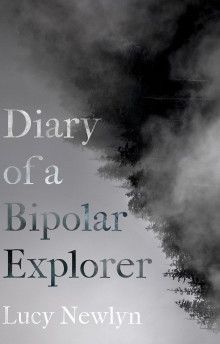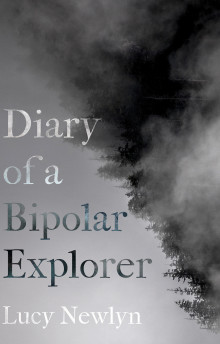Diary of a Bipolar Explorer
In her fifteen-year diary, Lucy Newlyn discloses recurring episodes of mania, depression, hallucination and paranoid delusion.


Published by Signal Books, February 2018
Launched at St Edmund Hall, 27 February 2018
Interview at Oxford Literary Festival, March 2018
Jacket-blurb
In 2002 Lucy Newlyn found herself incarcerated in a mental hospital in Leeds. She had been sectioned under the Mental Health Act as a danger to herself and others during a psychotic episode after several nights without sleep. The psychosis was triggered by nearly three years of grieving for a dead sister, followed by a vigil at her father’s deathbed during which she hallucinated that his hospital ward was a trench in the First World War.
The episode uncovered psychiatric problems, which led in due course to a diagnosis of Bipolar Disorder (manic depression). This condition, which involves extreme mood swings, is classified as a disability and requires medication; but it is also a source of creativity, giving access to some unusual dimensions of human experience.
In her fifteen-year diary, Lucy Newlyn discloses recurring episodes of mania, depression, hallucination and paranoid delusion. Describing her struggles with family life and the workplace, she de-mystifies bipolarity and critiques an environment which still, even in the twenty-first century, is suspicious of mental illness. Above all, she celebrates the discovery that writing poetry enables a cathartic engagement with her own condition.
Diary of a Bipolar Explorer is not a self-help manual but a candid confessional memoir which offers no easy solutions. It involves a mixture of observation and reflection, interspersing poetry with prose. Written accessibly, it will appeal to anyone interested in mental illness, creative process and the life of the mind.
Reviews
Interview with toofullto write.
Review by Neil Vickers, British Medical Journal 'Medical Humanities'
Review by Jasmine Jagger, Cambridge Quarterly
Podcasts
Interview with my former student Jude Cowan Montague on her radio programme 'The News Agents' in April 2018. Podcast available here
Lucy Newlyn and Richard Lawes in conversation, 10th May 2018 at St Edmund Hall. Podcast available here
Forthcoming events
Lucy Newlyn in Conversation with Poet Jenny Lewis, Wantage Literary Festival October 21, 2018
Extracts from the Book
June 2008: The questionnaires
They send me the same questionnaires every Monday. The data from both of them go into a double graph, which helps to build a picture of recurring patterns in my mood disorder. This is how I answered the multiple choice questions this week on the first of the questionnaires:
Depression
I take more than 60 minutes to fall asleep, more than half the time
I awaken more than once a night and stay awake for 20 minutes or more, more than half the time
I awaken at least one hour before I need to, and can’t go back to sleep
I feel sad more than half the time
There is no change in my usual appetite
I have not had a change in my weight
Most of the time I struggle to focus my attention or to make decisions
I largely believe that I cause problems for others
I do not think of suicide or death
Years ago they asked whether I’d describe it as a mood or a feeling.
It’s both.
They asked what it feels like.
In the mornings a wall; in the afternoons a tunnel; in the evenings a sticky envelope.
They asked if it ever gets better.
It’s always there. The sticky envelope is better than the wall.
They asked if there’s anything that might help it, anything from outside.
There isn’t an outside.
They asked what I thought it was.
I looked at the wall.
I asked what they thought it was.
Mania
This is the second questionnaire they send me every Monday. It’s briefer. The data go into the same graph but in a different colour. I can’t describe its shape. This is how I filled it in this week:
I often feel happier or more cheerful than usual
I often feel more self-confident than usual
I often need less sleep than usual
I frequently talk more than is usual
I have frequently been more active than usual
A long time ago they asked whether I’d describe it as a mood or a feeling.
It’s both.
They asked what it’s like.
Joy, hope, love, breath, communication, a drench of sunshine, sitting under the apple tree, high wind on the moors, a long open vista, energy that will never end; poetry in song, rhythm in poetry. Happiness that pierces and dissolves; the sense that everything is mysteriously connected.
They asked does anything make it better.
It's already the best there is.
They asked why I want it to go on.
Who wouldn’t?
They asked if anything helps it, anything from outside.
There isn’t an outside.
They asked what I thought it was.
You tell me.
They said we’re going to send you two questionnaires to fill in each week.
Why two? I’m one person.
The missing letter
Somehow, somewhere, something has been lost.
I thrash about, not knowing who to blame.
My past life’s mine no more, a frantic ghost.
Where is that letter when it’s needed most?
I’m sure they wrote it, and I think it came.
Somehow, somewhere, something has been lost.
I rail against mischance – the useless post –
All normal explanations seeming lame.
My past life’s mine no more, a frantic ghost.
The proof of what I did’s not much to boast;
I’d like it here in writing all the same
That something then was broken down, and lost.
Who is there left that I can really trust?
“Duty of Care” is just an empty name.
My past life’s mine no more – a frantic ghost,
A parasite that’s eaten by its host,
A piece of trash that others can defame.
Somehow, somewhere, something has been lost.
I cannot calculate the final cost
Of all that will be wagered in this game.
My past life’s mine no more, a frantic ghost;
And what is left is buried in the dust,
With no one but myself to feel the shame.
Somehow, somewhere, something has been lost -
My past life’s mine no more, a frantic ghost.